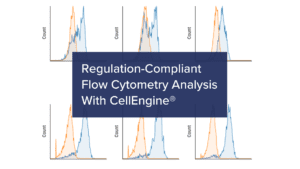October 12, 2022

If your research is subject to 21 CFR part 11, EU Annex 11, or equivalent regulations, you may have grappled with designing a regulation-compliant workflow to analyze flow cytometry data. Such regulations establish the required controls over key aspects of data analysis. Most of these requirements can only be met when deliberately designed into the analysis software. CellEngine, a new generation of flow cytometry analysis software, provides all the features required for compliance, allowing for cloud-based analysis that can fully meet regulations.
Capturing Audit Trails
Logging the creation, modification, or deletion of records is an integral part of regulation compliant research. CellEngine allows creating revisions, which are permanent and immutable snapshots of experiments that create a permanent record of analysis at any point. Detailed audit trails are captured, including what work was done, when, and by whom. Append-only comments can also be added to the audit trail, capturing why changes were made.
Personalized Data Access
Only authorized users should be able to complete tasks in compliant workflows, and all users need unique electronic signatures. Data in CellEngine is private by default but can be shared if required. CellEngine’s powerful identity and access management system lets administrators define custom roles comprised of granular permissions. Permissions can be assigned to individuals on specific folders and experiments, defining exactly what users can and cannot do. Access is highly customizable, based on study needs. For example, a reviewer could examine analysis without the ability to make modifications.
Readily Available and Protected Records
Reviewable records are available in both human-readable and electronic forms. CellEngine allows the download of complete experiments via two components: an archive of the FCS files and attachments that were uploaded to the experiment, and a JSON file containing all other aspects of the experiment. Individual aspects of an experiment, including gated populations, plots, illustrations, and statistics, are also downloadable.
CellEngine supports regulatory requirements for records to be protected, accurate, and retrievable by storing duplicate copies of data in geographically separated locations to protect against natural disaster or hardware failure. Users can be restricted from deleting experiments, and retention policies can be set for each experiment to protect against deletion entirely.
Customized Workflow Validation
Regulation-compliant research must validate the accuracy, reliability, and consistency of workflows. CellEngine is the first cytometry analysis platform to offer validation customized to your workflow. Customized test scripting from your cytometer files, analyzed with your process, can be continuously validated. As CellEngine is updated, we can provide validation reports verifying consistency.
Mandatory Training
Users must have the appropriate training to meet regulations. The CellEngine team can assist with training at any stage, including onboarding and follow-up training as needed.
Learn more about CellEngine’s many features designed to improve consistency of flow cytometry analysis, particularly for large and complex experiments.
Sign up for a free two-month trial or contact us for a live demo.
Watch the following video from our expert to learn more
About the author:

Anita Ray is a technical application specialist with CellEngine. She has ten years of experience in cytometry and worked in translational immuno-oncology prior to joining the CellEngine team.
You might also be interested by
CellTalk Blog
ELISpot vs. ICS: Optimizing Immune Monitoring in Clinical Trials with the Right Functional Assay
November 19, 2024
Immune Monitoring
More infoCellTalk Blog
Measure Target Engagement With Receptor Occupancy Assays by Flow Cytometry
September 17, 2024
Immune Monitoring
More infoBrochures & Infographics
High Performance Technologies for Cytokine Measurement
July 29, 2024
Immune Monitoring
More info